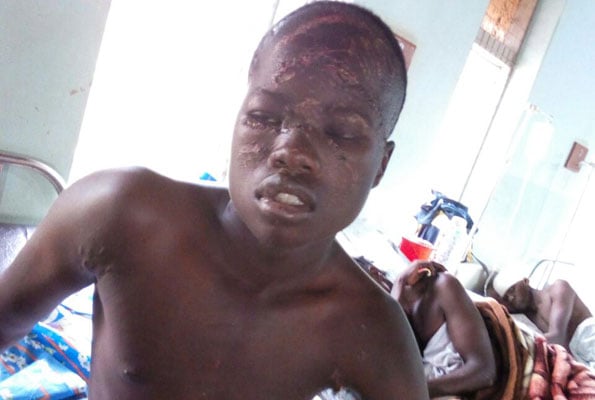Prime
Six out of your 10 friends have thought of committing suicide

About three weeks ago, Mustafa Lule, who can also be known as the Mabirizi jumper, attempted to end his life
What you need to know:
Did you know that depression is a mental health issue and it can lead to suicide if left unattended to? There are increasing cases of suicide or attempted suicide
Defined as the deliberate act of killing oneself, suicide is a social and public health problem. Globally, it is the 10th leading cause of deaths.
According to Prof Emilio Ovuga, a psychiatrist at Gulu University, 90 per cent of suicides are as a result of mental disorder and of these; depression is the most common, accounting for about 70 per cent.
Prof Ovuga says suicide is categorised as completed or successful if one’s action leads to death and it is attempted suicide if the action fails to kill the person.
About three weeks ago,
. This had the 17-year-old struggling to survive and nursing a severely fractured arm in the eleventh ward at Mulago referral hospital.
At the hospital, Lule lies on his hospital bed writhing in pain from his left arm, with a big chunk of his blue and red semi-woolen blanket hanging on one end of the corridor.
With a faint smile, he stretches out his hand and mumbles something to his seemingly weary mother who is standing by his bedside with folded arms. She pulls the blanket and covers him, leaving his heavily bandaged arm suspended in the air.
His reason

From Mabirizi complex, you can see Mapera house, one of the tallest buildings in the City.
Lule says he dropped out of school in Primary Three because he had an intellectual disability and started the hustle in life thereafter. At a tender age, he was forced to fend for himself since he was not his stepmother’s favourite person and his father was not supportive.
He was chanced to get a job down town in Kampala, popularly known as Kiyembe where he sold sewing machines. Lule was his family’s abode and always sent money to his separated parents and paid siblings’ fees.
That evening when his boss fired him, he felt useless and thought of ending his life. He was depressed and kept to himself. After weighing options of either poisoning or hanging himself, he resorted to falling off a building, and according to him, Mabirizi was the most accessible. He believed he would die instantly.
“I went to Mapeera house along Kampala road but the security was tight. They asked for an identification which I did not have and was told to move away. That’s when I decided to go to Mabirizi where I ascended the stairs to the rooftop without any hindrance,” he recollects, with so much confidence written on his scared face.

Screen grab showing the location of Mabirizi complex.
His 36-year-old mother Amatu Namakula says she received the news from her sister who ran home to her compound in Lukadde Kagoma shouting that Lule was dead. She fainted and her sister accompanied her to Mulago. “I was hopeless and could neither stand nor walk. For two days, my son was unconscious, he could neither eat nor speak,” she recounts.
Lule is the second born among five siblings. His mother had left him and his elder sibling at their father’s home in Bugoba in Kawempe.
However,
.
“I have asked him over and over in vain. It seems he is hiding something so fatal, that’s why he doesn’t disclose to me,” she says.
Although experts say those who have previously attempted to commit suicide are at higher risk for future attempts, Lule is remorseful. With all the media attention and the fact that he survived, he says he can never think about committing suicide again.
“I believe God saved me for a reason. There is something he has in store for me. Next time I will know better how to deal with my losses and stresses,” he says.
He has skills in repairing sewing machines and believes he can earn a living through this when he heals.
Dr Edgar Muhumuza, a neural surgeon and senior consultant in charge of the neuro ward where he underwent treatment says Lule is a survivor and only has to undergo treatment for his fractured arm.
“I suspect he landed on his limbs. Had it been by the neck or head, he would have died instantly or by now because his brain would be injured. Remember the brain has nowhere to swell to, so one dies incidentally,” he explains.
Dr Raymond Odokonyero, a psychiatrist at Butabika National referral hospital attributes causes of suicidal thoughts to mental disorders such as depression, bipolar, alcoholism, and or substance misuse. Other causes include domestic violence, problems with social networks and sad events in life.
The rest of the cases of suicidal behaviour, Odokonyero says, are due to stress in daily life, problems in relationships, poverty, unemployment, job loss, chronic health conditions such as heart failure and kidney failure, stigma due to HIV/AIDS and other chronic illnesses like cancer.
However, suicide can be hereditary. Chances are that if there are suicide victims in one’s lineage, he or she is likely to follow the trend.
The commonest methods of suicide are hanging, poisoning and use of fire arms.
Suicides worldwide
In Uganda, the World Health Organisation data published in May 2014 revealed suicide deaths had reached 4,323 or 1.35 per cent of total deaths.
The age adjusted death rate is 18.67 per 100,000 of the population, which ranks Uganda 17th in the world. Suicide rates in neighbouring Tanzania are higher at 23.34 and lower in Kenya at 11.68 per 100,000.
Three quarters of suicides globally occur in the developing world. Rates of completed suicides are generally higher in men than in women, ranging from 1.5 times as much in the developing world to 3.5 times in the developed world.
Prof Ovuga notes that suicide is generally common among those over the age of 70 in high-income countries; however, in Uganda, it is common among youth aged 24 to 34 years, and 90 percent of suicides are medical.
Notably, wowen attempt suicide four times more than men and men succeed four times more than women.
Globally, there are an estimated 10-20 million non-fatal attempted suicides every year. These attempts may lead to injury and long-term disabilities and are common in young people and females in the western world.
Signs of a suicidal mind
Dr Muhumuza says people contemplating committing suicide normally have behavioural changes such as keeping to themselves. “People who are generally known as friendly start keeping to themselves. Others suddenly change their mood,” he says.
Some behave abnormally and do things that they are not supposed to do, for instance urinating in awkward places.
Besides isolation, suicidal persons tend to be unnecessarily apologetic, want to pay all debts and give away possessions or ask others to take care of their loved ones.
Before you jump
Twenty per cent of the population in Uganda has conteplated suicide. Six in ten people randomly interviewed on the street by this newspaper admitted to have had suicidal thoughts at least once or twice in their lifetime.
Among them was 26-year-old Patrick Ssebufu, a street preacher who says he was diagnosed with kidney failure last year and in the same period his girlfriend ended their four-year-old relationship.
“Everything was a mess. I was not in good terms with my Muslim parents. Dying was going to be that simple. I just had to stop taking my medication,” he shares.
Luckily, his church members came home to pray for his health and he had to rethink his position.
Also Ruth Kanyago, a receptionist, says she was saved by the bell one time when she found out she had been lied to by her baby’s father who promised to marry her, only to find out he was cohabiting with his ex-girlfriend, with who he had earlier claimed he had cut ties.
“I left work that day, bought poison and ran back to my room. I sat on my bed for 30 minutes and was only saved by my daughter’s cries in the compound,” she recalls.
Prevention
Like the adage prevention is better than cure, Nobert Bwana, a psychotherapist, says the commonest methods for controlling suicidal behaviour are medication and psychotherapy or counselling.
Mr Bwana advises families and friends to refer the persons concerned to a mental health professional if they declare suicidal feelings.
The locus of association states that people will likely commit suicide where somedody else has been successful. Therefore, Odokonyero says media should give less coverage to these places during incidents.
In case of depression, seek cancelling. “Counsellors are very helpful in changing the minds of suicidal persons. Do not keep to yourself,” cautions Henry Nsubuga, a counselling psychologist.
Lastly, limit access to methods of suicide for instance by tightening security in tall buildings and restricting sale of poisons.
Did you know?
What happens when you drop by the head
A head injury is defined as any sort of injury to the brain, skull, or scalp. Dr Muhumuza says head injuries range from a bruise to a traumatic brain injury.
He goes ahead to explain they can be minor or severe and external or internal with the commonest being scalp wounds, skull fractures, concussions which is a sudden but short-lived loss of mental function that occurs after injury to the head.
Additionally, a person with concussion may appear confused, but may not necessarily be unconscious.
Severe head injuries are coupled with damaged brains. “The brain is damaged and develops a crop or brain swelling, which is a bad indicator,” Dr Muhumuza explains, adding that this is because once the brain swells, it shuts down or one automatically dies.





